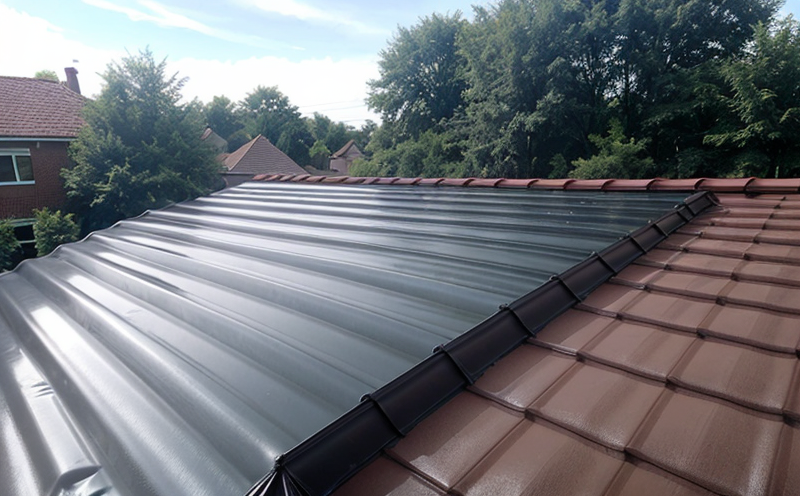ASTM D1970 Modified Bitumen Sheet Performance
The ASTM D1970 test method is specifically designed to evaluate the performance of modified bitumen sheets, which are widely used in roofing and waterproofing applications. These materials are essential components of building infrastructure as they provide durability, flexibility, and resistance to environmental conditions. The test measures key properties such as tensile strength, elongation, and tear resistance under defined loading conditions, ensuring that these materials meet the required performance standards.
The modified bitumen sheets used in roofing and waterproofing applications are a blend of bitumen with various modifiers like polymers or elastomers. These additives enhance the material's properties, making it more suitable for use in harsh environments. The ASTM D1970 test is crucial because it helps to ensure that these materials can withstand typical stresses encountered during construction and operation.
The test involves subjecting a specimen of modified bitumen sheet to tensile loading until failure occurs. This provides critical insights into the material's strength and flexibility, which are vital for predicting its performance in real-world scenarios. Understanding these properties is essential for quality managers, compliance officers, R&D engineers, and procurement teams who need assurance that materials meet industry standards.
For instance, tensile strength indicates how much force can be applied before the material breaks, while elongation measures the extent to which it can stretch before breaking. These metrics are crucial in determining the durability of roofing membranes and waterproofing systems. By using ASTM D1970 testing, stakeholders can ensure that they select materials capable of withstanding the stresses involved in typical roof installations.
Moreover, the test helps in identifying potential weaknesses or areas for improvement in the design and manufacturing process of modified bitumen sheets. This ensures that products not only meet current standards but also anticipate future demands and challenges. Compliance officers can rely on this data to ensure their organization is adhering to relevant regulations and industry best practices.
In summary, the ASTM D1970 test method plays a pivotal role in ensuring the quality and performance of modified bitumen sheets used in roofing and waterproofing applications. Its ability to provide detailed insights into material properties makes it an indispensable tool for stakeholders involved in building infrastructure.
Why It Matters
The importance of ASTM D1970 testing cannot be overstated, especially when considering the critical role that modified bitumen sheets play in roofing and waterproofing applications. These materials are exposed to a variety of environmental factors, including temperature changes, UV radiation, and mechanical loads, which can significantly impact their performance over time.
By conducting ASTM D1970 tests, stakeholders can ensure that the modified bitumen sheets they use meet strict quality standards. This not only enhances the durability and longevity of roofing systems but also contributes to overall building sustainability by reducing maintenance costs and extending the lifespan of structures. Compliance with these standards is crucial for maintaining safety and performance in built environments.
From a broader perspective, ensuring high-quality materials through rigorous testing helps protect both consumers and manufacturers. Consumers can rest assured that they are investing in reliable products, while manufacturers gain valuable feedback to improve their offerings continuously. This collaborative approach fosters innovation within the industry and promotes best practices across the board.
In addition, adherence to ASTM standards is often a prerequisite for certification programs recognized by regulatory bodies. Meeting these requirements demonstrates commitment to excellence and can enhance an organization's reputation among clients and partners.
Scope and Methodology
| Test Objective | Description |
|---|---|
| Determine tensile strength, elongation, and tear resistance | The test involves subjecting a specimen of modified bitumen sheet to tensile loading until failure occurs. This provides critical insights into the material's strength and flexibility. |
| Assess durability under defined stress conditions | This helps in identifying potential weaknesses or areas for improvement in the design and manufacturing process. |
| Evaluate compliance with industry standards | The test ensures that materials meet relevant ASTM specifications, enhancing overall product quality and performance. |
The ASTM D1970 test method is designed to evaluate the tensile strength, elongation, and tear resistance of modified bitumen sheets. The process involves preparing a specimen according to the specified dimensions and applying it under defined loading conditions until failure occurs. This provides critical insights into the material's performance characteristics.
The apparatus used for this test includes a universal testing machine capable of applying controlled tensile loads on the prepared specimens. Precise measurements are taken using strain gauges, displacement sensors, and load cells to ensure accurate data collection during the test.
Acceptance criteria for ASTM D1970 tests are based on international standards such as ASTM D6573-21. Compliance with these criteria ensures that the modified bitumen sheets meet the necessary performance requirements. For instance, a minimum tensile strength of 10 MPa and an elongation of at least 400% are typically required to pass this test.
Why Choose This Test
- Ensures compliance with relevant ASTM standards
- Provides accurate measurement of key performance indicators (KPIs)
- Promotes sustainable building practices by enhancing material durability and longevity
- Fosters innovation within the industry through continuous improvement of products
- Meets regulatory requirements, thereby enhancing an organization's reputation among clients and partners
- Reduces maintenance costs associated with substandard materials
- Aids in selecting high-quality products for roofing and waterproofing applications
The ASTM D1970 test method is a reliable choice for ensuring the quality of modified bitumen sheets used in roofing and waterproofing applications. By choosing this test, stakeholders can guarantee that their materials meet strict performance standards, promoting both safety and efficiency in built environments.





